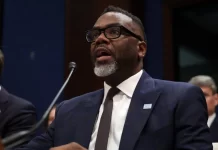By Stacy M. Brown, NNPA Newswire Senior National Correspondent
@StacyBrownMedia
View this post on Instagram
With intense pressure from Democrats and constituents nationwide, President Biden signed an executive order attempting to ensure access to contraception and protect abortion services.
Biden said he’s ordering U.S. Health and Human Services Secretary Xavier Becerra to take action to safeguard access to abortion care and emergency medical assistance.
Biden said he’s asked Becerra to increase outreach and public education efforts, and to engage private attorneys to represent patients.
He wants Becerra to report back to the White House within a month.
Protests and outcry have dominated the political sphere since the U.S. Supreme Court overturned Roe v. Wade last month, triggering immediate bans on abortion in some states.
Biden has said he’s without authority to do anything about trying to reverse the high court’s decision.
He previously noted that an executive order would fall short of any meaningful impact on the ruling.
“No executive action from the president can do that,” Biden said last month when asking Congress to codify Roe v. Wade.
However, the president’s order seeks to help by safeguarding the privacy of patients and their information.
According to a fact sheet provided by the White House, Biden’s order “takes additional steps to protect patient privacy, including by addressing the transfer and sales of sensitive health-related data, combatting digital surveillance related to reproductive health care services, and protecting people seeking reproductive health care from inaccurate information, fraudulent schemes, or deceptive practices.”
The fact sheet noted that the order would:
- Protect Consumers from Privacy Violations and Fraudulent and Deceptive Practices.
- The President has asked the Chair of the Federal Trade Commission to consider taking steps to protect consumers’ privacy when seeking information about and provision of reproductive health care services.
- The President also has directed the Secretary of HHS, in consultation with the Attorney General and Chair of the FTC, to consider options to address deceptive or fraudulent practices, including online, and protect access to accurate information.
- Protect Sensitive Health Information.
HHS will consider additional actions, including under the Health Insurance Portability and Accountability Act (HIPAA), to better protect sensitive information related to reproductive health care.
The Secretary of HHS has already directed the HHS Office for Civil Rights to take initial steps to ensure patient privacy and nondiscrimination of patients, as well as providers who provide reproductive health care, including by:
- Issuing new guidance to address how the HIPAA Privacy Rule protects the privacy of individuals’ protected health information, including information related to reproductive health care.
- The guidance helps ensure doctors and other medical providers and health plans know that, with limited exceptions, they are not required – and in many cases, are not permitted – to disclose patients’ private information, including to law enforcement.
Issuing a how-to guide for consumers on steps they can take to make sure they’re protecting their personal data on mobile apps, the White House said.
The Executive Order addresses the heightened risk related to seeking and providing reproductive health care and would:
- Protect Patients, Providers, and Clinics.
- The Administration will ensure the safety of patients, providers, and third parties, and to protect the security of other entities that are providing, dispensing, or delivering reproductive health care services.
- This charge includes efforts to protect mobile clinics, which have been deployed to borders to offer care for out-of-state patients.
To ensure the Federal government takes a swift and coordinated approach to addressing reproductive rights and protecting access to reproductive health care, the President’s Executive Order would:
- Establish an Interagency Task Force.
- The President has directed HHS and the White House Gender Policy Council to establish and lead an interagency Task Force on Reproductive Health Care Access, responsible for coordinating Federal interagency policymaking and program development.
- This Task Force will also include the Attorney General. In addition, the Attorney General will provide technical assistance to states affording legal protection to out-of-state patients as well as providers who offer legal reproductive health care.


















